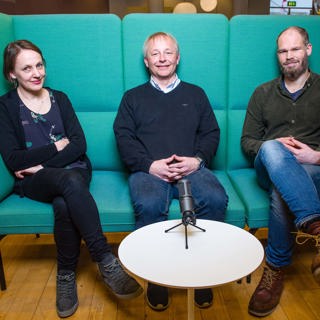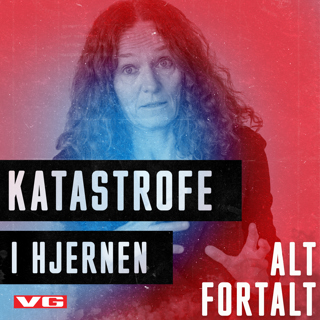![[MINI] Data Provenance](https://cdn.podme.com/podcast-images/99E5B4C49CC9487AB4880B5C8DF050F0_small.jpg)
[MINI] Data Provenance
This episode introduces a high level discussion on the topic of Data Provenance, with more MINI episodes to follow to get into specific topics. Thanks to listener Sara L who wrote in to point out the Data Skeptic Podcast has focused alot about using data to be skeptical, but not necessarily being skeptical of data. Data Provenance is the concept of knowing the full origin of your dataset. Where did it come from? Who collected it? How as it collected? Does it combine independent sources or one singular source? What are the error bounds on the way it was measured? These are just some of the questions one should ask to understand their data. After all, if the antecedent of an argument is built on dubious grounds, the consequent of the argument is equally dubious. For a more technical discussion than what we get into in this mini epiosode, I recommend A Survey of Data Provenance Techniques by authors Simmhan, Plale, and Gannon.
9 Jan 201510min

Doubtful News, Geology, Investigating Paranormal Groups, and Thinking Scientifically with Sharon Hill
I had the change to speak with well known Sharon Hill (@idoubtit) for the first episode of 2015. We discuss a number of interesting topics including the contributions Doubtful News makes to getting scientific and skeptical information ranked highly in search results, sink holes, why earthquakes are hard to predict, and data collection about paranormal groups via the internet.
3 Jan 201531min
![[MINI] Belief in Santa](https://cdn.podme.com/podcast-images/99E5B4C49CC9487AB4880B5C8DF050F0_small.jpg)
[MINI] Belief in Santa
In this quick holiday episode, we touch on how one would approach modeling the statistical distribution over the probability of belief in Santa Claus given age.
26 Des 20149min

Economic Modeling and Prediction, Charitable Giving, and a Follow Up with Peter Backus
Economist Peter Backus joins me in this episode to discuss a few interesting topics. You may recall Linhda and I previously discussed his paper "The Girlfriend Equation" on a recent mini-episode. We start by touching base on this fun paper and get a follow up on where Peter stands years after writing w.r.t. a successful romantic union. Additionally, we delve in to some fascinating economics topics. We touch on questions of the role models, for better or for worse, played a role in the ~2008 economic crash, statistics in economics and the difficulty of measurement, and some insightful discussion about the economics charities. Peter encourages listeners to be open to giving money to charities that are good at fundraising, and his arguement is a (for me) suprisingly insightful logic. Lastly, we have a teaser of some of Peter's upcoming work using unconventional data sources. For his benevolent recommendation, Peter recommended the book The Conquest of Happiness by Bertrand Russell, and for his self-serving recommendation, follow Peter on twitter at @Awesomnomics.
19 Des 201423min
![[MINI] The Battle of the Sexes](https://cdn.podme.com/podcast-images/99E5B4C49CC9487AB4880B5C8DF050F0_small.jpg)
[MINI] The Battle of the Sexes
Love and Data is the continued theme in this mini-episode as we discuss the game theory example of The Battle of the Sexes. In this textbook example, a couple must strategize about how to spend their Friday night. One partner prefers football games while the other partner prefers to attend the opera. Yet, each person would rather be at their non-preferred location so long as they are still with their spouse. So where should they decide to go?
12 Des 201418min

The Science of Online Data at Plenty of Fish with Thomas Levi
Can algorithms help you find love? Many happy couples successfully brought together via online dating websites show us that data science can help you find love. I'm joined this week by Thomas Levi, Senior Data Scientist at Plenty of Fish, to discuss some of his work which helps people find one another as efficiently as possible. Matchmaking is a truly non-trivial problem, and one that's dynamically changing all the time as new users join and leave the "pool of fish". This episode explores the aspects of what makes this a tough problem and some of the ways POF has been successfully using data science to solve it, and continues to try to innovate with new techniques like interest matching. For his benevolent references, Thomas suggests readers check out All of Statistics as well as the caret library for R. And for a self serving recommendation, follow him on twitter (@tslevi) or connect with Thomas Levi on Linkedin.
5 Des 201458min
![[MINI] The Girlfriend Equation](https://cdn.podme.com/podcast-images/99E5B4C49CC9487AB4880B5C8DF050F0_small.jpg)
[MINI] The Girlfriend Equation
Economist Peter Backus put forward "The Girlfriend Equation" while working on his PhD - a probabilistic model attempting to estimate the likelihood of him finding a girlfriend. In this mini episode we explore the soundness of his model and also share some stories about how Linhda and Kyle met.
28 Nov 201416min

The Secret and the Global Consciousness Project with Alex Boklin
I'm joined this week by Alex Boklin to explore the topic of magical thinking especially in the context of Rhonda Byrne's "The Secret", and the similarities it bears to The Global Consciousness Project (GCP). The GCP puts forward the hypothesis that random number generators elicit statistically significant changes as a result of major world events.
21 Nov 201441min




















